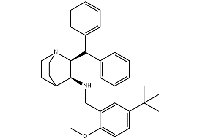Maropitant (INN; brand name: Cerenia, used as maropitant citrate (USAN), is a neurokinin-1 (NK1) receptor antagonist developed by Zoetis specifically for the treatment of motion sickness and vomiting in dogs. It was approved by the FDA in 2007, for use in dogs and in 2012, for cats.
Maropitant mildly reduces intra-procedural inhaled anesthesia dose requirements but does not confer analgesia itself.
Veterinary uses
Injectable maropitant is used in dogs to treat and prevent acute vomiting; tablets are used for preventing vomiting from a variety of causes, though it requires a higher dose to prevent vomiting from motion sickness. The injectable version is also licensed for preventing and treating acute vomiting in cats.
Maropitant is effective in treating vomiting from a variety of causes, including gastroenteritis, chemotherapy, and kidney failure; when given beforehand, it can prevent vomiting caused by using an opioid as a premedication. Some have claimed that maropitant is better at treating vomiting than nausea, pointing to cats with chronic kidney disease who, when receiving maropitant, had a reduction in vomiting but no corresponding increase in appetite.
Maropitant has been used in acute cases of rapid or labored breathing to prevent vomiting that could lead to aspiration pneumonia. It has been given in combination with a benzodiazepine to cats prior to stressful events (such as a veterinary visit) to possibly relieve hypersensitivity.
When compared to other antiemetics, maropitant has similar or greater effectiveness to chlorpromazine and metoclopramide for centrally mediated vomiting induced by apomorphine or xylazine. It works better than chlorpromazine and metoclopramide for vomiting peripherally induced induced with syrup of ipecac. Unlike dimenhydrinate and acepromazine, which are used for motion sickness, maropitant does not cause sedation.
Maropitant has been used as an adjunct treatment in severe bronchitis due to its weak anti-inflammatory effects. It alleviates visceral pain and has been found to reduce the amount of general anesthesia (both sevoflurane and isoflurane) needed in some operations.
Some believe that maropitant can be used in rabbits and guinea pigs to relieve pain caused by ileus (impaired bowel movements), though it lacks antiemetic effects in rabbits, who cannot vomit.
